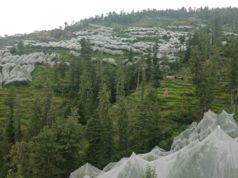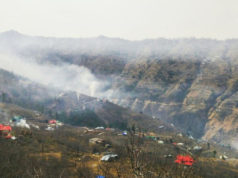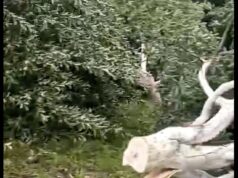The apple orchards in Kashmir, Uttarakhand, and Himachal Pradesh are facing a daunting challenge as a prolonged drought casts its shadow over the apple-producing heartlands. In response to this adversity, Dr. DP Sharma from Horticulture University Nauni proposed solutions to ensure the survival and vitality of apple plants in the wake of this relentless dry spell.
The relentless drought, exacerbated by insufficient snowfall, has created a crisis for fruit production in the region, threatening the well-being of apple plants. Dr. Sharma, the Head of Fruit Science, acknowledges the gravity of the situation, highlighting the susceptibility of apple plants to the vagaries of fluctuating weather conditions, which can severely impact fruit development, quality, and overall production.
Also Read: Trouble in Himachal: Drought Puts Apple Crop at Risk
In response to this dire scenario, scientist has suggested a comprehensive set of measures aimed at safeguarding apple plants across these vital apple-producing regions. A primary focus is on shielding young apple plants and nursery stock from the detrimental effects of frost during adverse weather conditions. Dr. Sharma advises orchardists to implement light evening irrigation as a strategic defense against frost. Additionally, covering plants with gunny bags or straw stands as a practical measure to mitigate the impact of frost on vulnerable crops.
Crucial to the proposed solutions is soil conservation, with farmers advised to abstain from disrupting the soil through hoeing and weeding operations to preserve essential moisture. Emphasizing the need for proactive measures, the adoption of mulching, and utilizing dry grass or poly sheets in tree basins, is encouraged to maintain optimal moisture levels and suppress weed growth, providing vital support to apple plants during these challenging times.
Also Read: Himachal Pradesh Faces Driest January in 122 Years with a Record 99.7% Rainfall Deficit
As the apple growers in key apple-producing regions grapple with the consequences of the prolonged dry spell, collaboration between scientists and orchardists becomes paramount. By embracing these recommended measures, farmers can fortify their apple orchards against unpredictable weather patterns, ensuring the resilience of the region’s vital horticultural sector. The timely implementation of these solutions is critical for saving apple plants and sustaining the rich tradition of fruit cultivation in these key apple-producing states.












